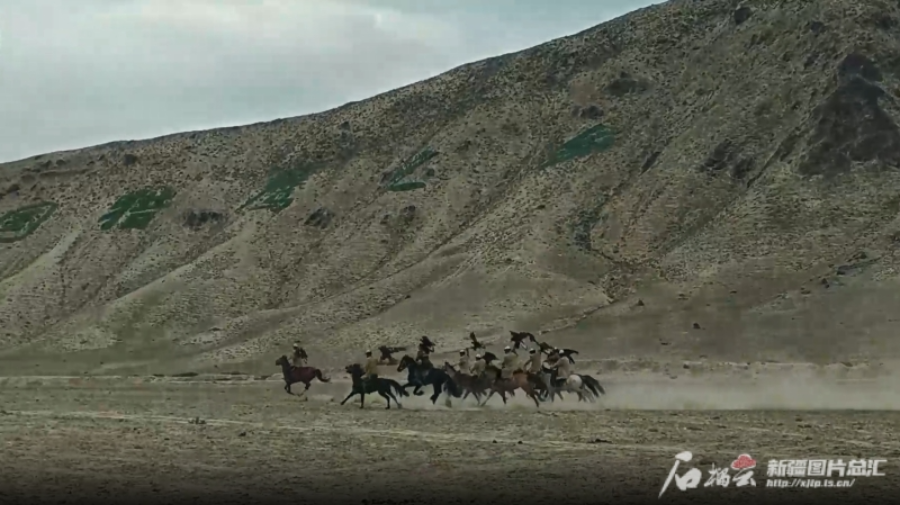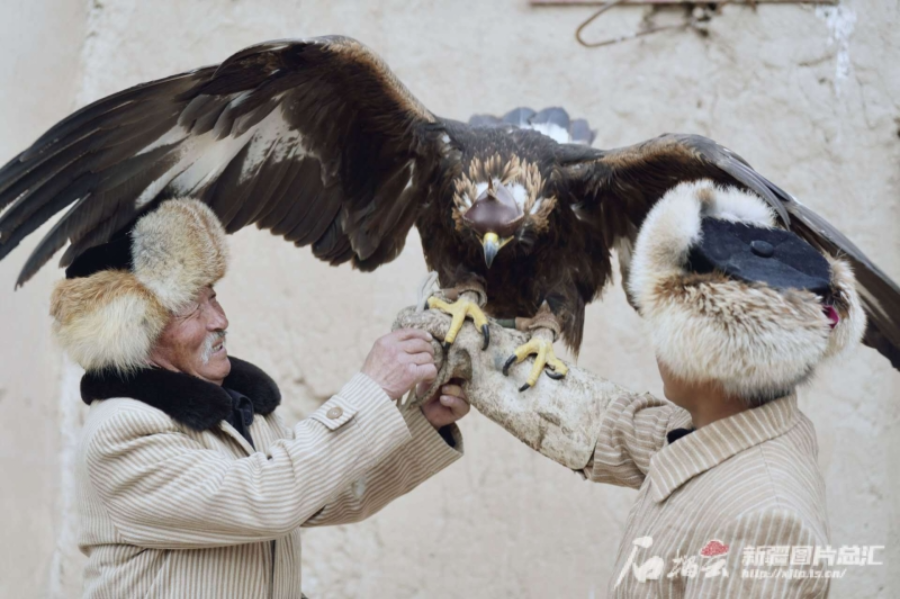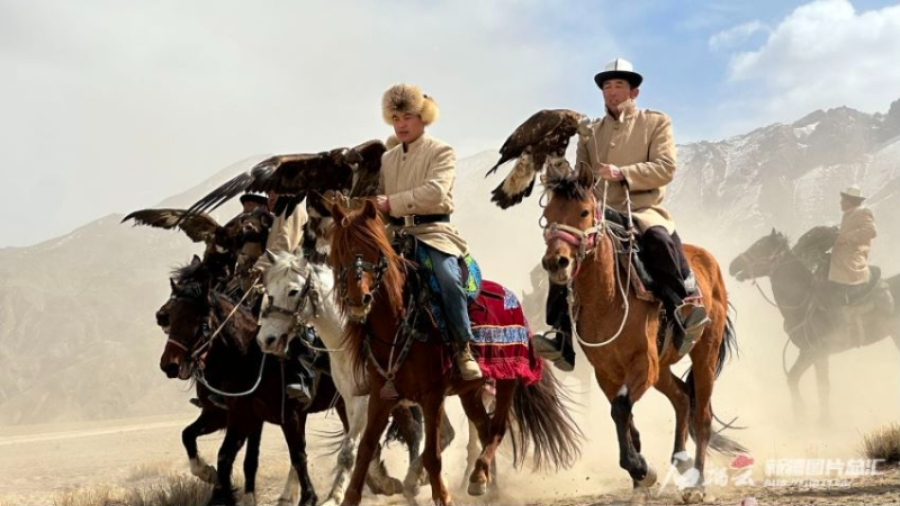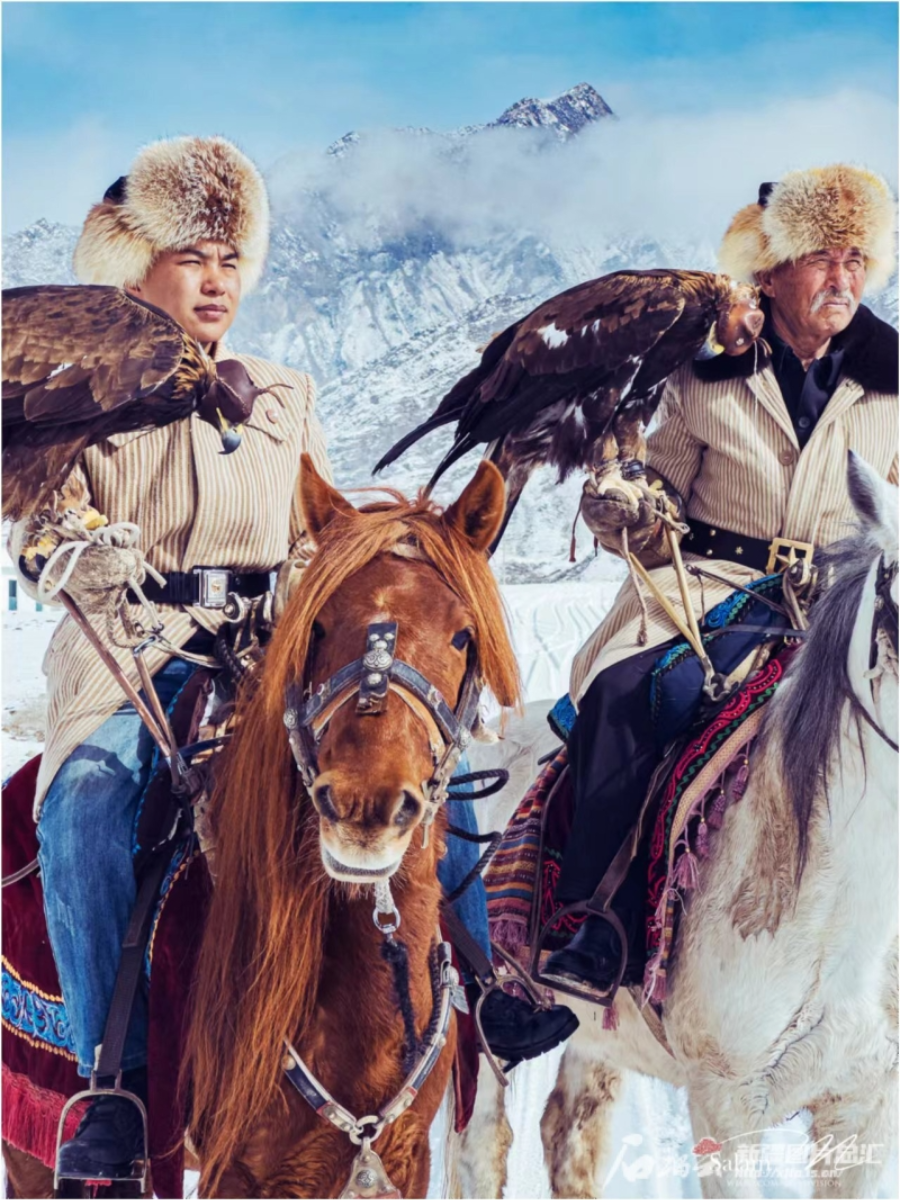Shiliuyun-Xinjiang Daily (Reporter Song Haibo) news: “Put on your gloves, raise your arm high, don't be afraid, the eagle will not harm those who respect it...” On July 21, 2024, at the falconry ground in Sumutashi Township, Akqi County, Kizilsu Kirgiz Autonomous Prefecture, northwest China's Xinjiang Uygur Autonomous Region, tourists were captivated by the spectacle of herdsmen riding horses with eagles.
The individual guiding the tourists in their intimate interactions with the eagles is Timurbek Jumat. He is a county-level representative inheritor of the Kirgiz falconry, a project listed as an intangible cultural heritage. Born in the new millennium, he has been immersed in the tradition of playing with eagles since his childhood.

Photo shows falconers perform falconry shows at the falconry ground in Sumutashi Township, Akqi County, Kizilsu Kirgiz Autonomous Prefecture, northwest China's Xinjiang Uygur Autonomous Region. (Photo by Shiliuyun-Xinjiang Daily/ Song Haibo)
"When I was a child, my grandfather told me that the eagle is our friend and a member of our family." Timurbek's grandfather, Kurmashi Hutman, is a national inheritor of the Kirgiz falconry and has trained more than 300 inheritors to date. Influenced by his family's tradition, Timurbek fell in love with falconry at the age of 10.
Akqi County is located in a high-altitude, cold mountainous area with a harsh natural environment. To obtain a desired eaglet, falconers must climb to the mountain peaks. Using ropes and climbing with their hands and feet, they must proceed with utmost care, nimbly navigating the cliffs.
"We will report to the local authorities before we look for the eaglets," Timurbek explained. When they find an eagle's nest, they only take one eaglet, and if there is only one eaglet in the nest, they will leave it to maintain the balance and harmony of nature.
The process of searching for eaglets is an extreme challenge to both physical strength and willpower. "In the past, we could choose from common birds of prey such as eagles, hawks, and vultures for training, but now falconry mainly focuses on the golden eagle."

Photo shows Timurbek Jumat (R) and his grandfather Kurmashi Hutman. (Photo provided by Timurbek Jumat)
"The young eagles we bring back are only five or six months old and need to be fed with horse, cow, or sheep meat by the falconers," said Timurbek. To eliminate the eagles' wild nature, falconers would cover the eagle's eyes and place it on a swinging wooden stick suspended in the air. By continuously moving it, the eagle would gradually adapt and develop a bond with the falconer.
Falconry training typically involves simulated hunting methods. Falconers hold a thin rope with one end tied to a fake rabbit made from a fox's tail or rabbit skin, simulating prey running ahead, and making rhythmic "click-click" sounds to attract the eagle and stimulate its hunting instinct. Once the eagle captures the "prey," the falconer immediately feeds it special food (fresh horse or beef meat, soaked in warm water to remove blood and cut into small pieces) as a reward for its performance. Timurbek said, "This kind of training will be carried out three to four times a day, with the distance and height gradually increasing, and after about 15 days, the eagle can initially master the skills of capturing prey and returning safely."

Photo shows Timurbek Jumat (third from the right) in falconry performances. (Photo provided by Timurbek Jumat)
Timurbek, who has been companions with eagles since childhood, has a deep affection for them. He knows well that taming an eagle requires heartfelt communication, "only in this way can a stubborn eagle communicate with humans."
In May of this year, the falcon cultural and tourism season event was held in Sumutashi Township, Akqi County, attracting a large number of out-of-town tourists. "When I am with the eagle, I feel that life is full of fun," said Timurbek, who resigned from his job in Urumqi and returned to his hometown to showcase the intangible cultural heritage of falconry with his grandfather.
"Now the falconry ground is constantly improving its infrastructure and services. I have also become responsible for the falconry performances. More than 80 falconers from several townships around take turns to perform regularly, and there will be bonuses at the end of the year. The number of tourists coming to watch the falconry performances is increasing, our income has increased, and the eagles are fed better and better."

Photo shows Timurbek Jumat (L) and his grandfather Kurmashi Hutman. (Photo provided by Timurbek Jumat)
The lifespan of an eagle can reach 40 to 70 years, however, the bond between falconers and their eagles often only lasts five to seven years. "When it's time to release the eagle into nature, the falconer will feed it well, apply butter to its talons and beak, hoping good luck for them in the wild," said Timurbek as he gently stroked his beloved eagle, a bird with a white feather on its wing that he has raised for two years, named "Bai Jian." "Every time the eagle is released into nature, the falconer will take it to the mountaintop, raise his arm, and the eagle will spread its wings and soar high, disappearing into the blue sky."
(A written permission shall be obtained for reprinting, excerpting, copying and mirroring of the contents published on this website. Unauthorized aforementioned act shall be deemed an infringement, of which the actor shall be held accountable under the law.)









